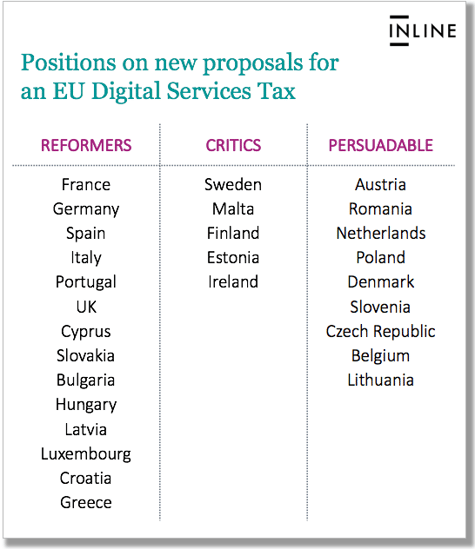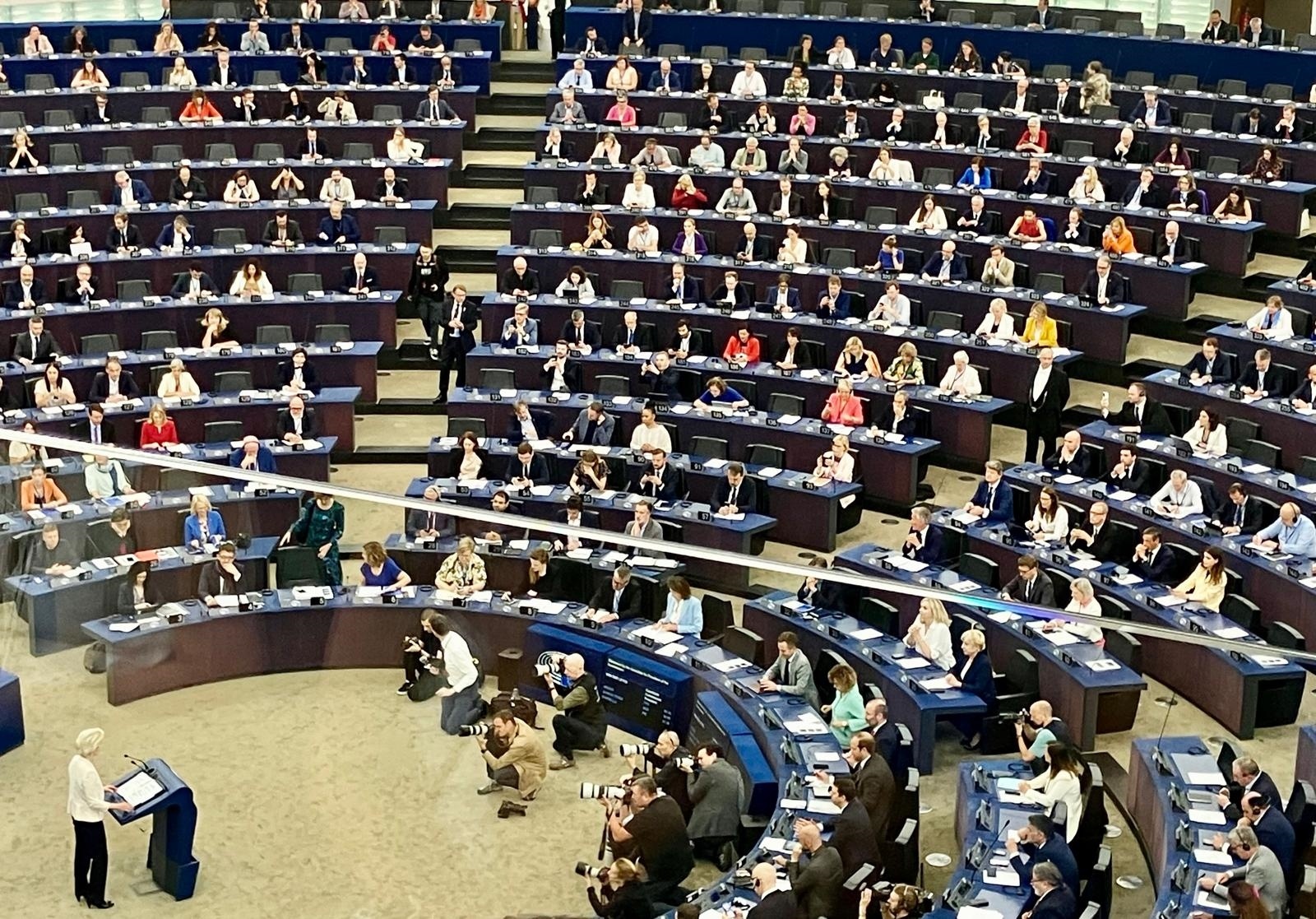Europe's big tech tax: the latest proposals for a digital services tax
by Inline Policy on 11 Dec 2018
The EU’s Member States have failed to agree on the introduction of a tax on revenues from digital services. But pressure from the European Commission, European Parliament and EU citizens indicate that this is not an issue that is going to disappear any time soon.
The activities of large, predominantly US tech companies operating in Europe has permeated much of the EU’s work in the digital sphere, with corporate tax having been taken up as a key example of the different treatment tech companies enjoy over bricks and mortar business models. How far this perception of unfairness actually translates into real evidence has been relegated to the side-lines of the debate. It was only due to a handful of Member States and their firm belief that tax should only be dealt with through the OECD that blocked progress on the controversial proposal for an EU-wide digital services tax at the 4 December ECOFIN Council meeting.
The 11th hour political declaration
Undeterred by the failed agreement on the digital services tax in its current form, the proposal’s biggest supporter French Finance Minister Bruno Le Maire has managed to convince his German counterpart Olaf Scholz to table a new idea to secure adoption of the tax. Germany’s support for the tax had faltered in recent months due to a backlash against the tax from the US and the lingering threat of retaliatory action against German exporters. As the biggest and one of the most influential countries, this was a problem, even more so as this is a policy area that requires unanimity amongst Member State governments for proposals to come into force.
The Franco-German compromise led them to table a political declaration the night before the 4 December ECOFIN meeting proposing a 3% tax just on revenues from online advertising. This is significantly narrower than the scope of the Commission’s proposal, which included three different types of digital services, however Member States would be permitted to widen this scope if they wish. The proposal suggested that the tax would only be implemented from 1 January 2021 and would be withdrawn if the OECD found an international agreement on reforming tax rules, which some expect will be achieved in 2020.
European Commission’s reaction
European Commissioner for Taxation Pierre Moscovici could not hide his disappointment at the ECOFIN Council when it was announced that the governments had failed to agree a position on the Commission’s proposal. However, due to the Commission’s key concern being the risk of a fragmented internal market if the Member States start adopting their own digital tax regimes, he has given his blessing to the French/German proposal as offering the best way forward. The Commission will produce a revised text in early 2019, with a view to a position being adopted by the ECOFIN Council in March 2019, in time to show citizens that the EU is capable of tackling big tech ahead of the European Parliamentary elections in May.
The view from the European Parliament
While the European Parliament does not have any decision-making power over tax issues, it does have the power to issue Opinions to advise the Member States. MEPs in the Economic and Monetary Affairs (ECON) Committee adopted their Opinion on the proposed digital services tax on 3 December. Some of the most interesting proposed amendments to the Commission’s plans were made by Wolf Klinz MEP (ALDE, Germany) who rejects the proposal for a digital services tax due to his views it is based on inaccurate figures. He tabled amendments, asked questions to the Commission, and spoke in debates to draw attention to the fact that the findings of the study on which the Commission has based its argument that multinational tech companies pay significantly lower corporate tax than other types of companies have now been debunked – by the author himself amongst others. The 2016 study by the Centre for European Economic Research has been thrown into doubt by the lead author Prof. Dr Christoph Spengel, who has now distanced himself from these findings. In an interview with Bloomberg, he has said that “effective tax rates for digital and traditional businesses cannot be compared one-by-one” because digital businesses earn different types of income. Nevertheless, Mr Klinz’s amendments were rejected by the ECON Committee and so never made it into the final Opinion.
In contrast, Rapporteur for the Opinion Paul Tang MEP (S&D, Netherlands) represents the bulk of MEPs who believe big tech needs to pay more, particularly if they are generating significant value from the activities of their European users. Mr Tang is highly suspicious of the levels of tax paid by big tech, and has highlighted in debates that Denmark, Sweden, and Ireland, which have tax agreements with Facebook, are all against an EU digital services tax.
Although the adopted Opinion has been rendered largely redundant due to the new proposal by France and Germany, and although the Parliament only has an advisory role in tax issues, it is an important indicator of the public mood. As the EU’s only directly elected institution, the results and turnout levels in May’s European Parliamentary elections will be an important indicator of how citizens are feeling about the EU and its relevance in an increasingly globalised world. It is a common critique that the EU has in the past failed to secure tangible results on issues important to its citizens. The risk of failing to respond to public concern about the levels of tax paid by multinational firms, particularly in the tech sector, is a current headache of EU and national policymakers alike.

Where do we go from here?
The new approach proposed by France and Germany would aim for minimum harmonisation, meaning the risk of different digital tax regimes being introduced across the EU is reduced but does not disappear. A number of Member States, namely Spain, Italy, and Portugal, were disappointed that no agreement could be found on the Commission’s proposal and they would be able to introduce their own rules that go beyond the minimum in the Franco-German proposal. The one thing that unites all Member States is that OECD-level reform of corporate tax rules is preferable to EU-only rules, even if a number believe parallel rules for the Single Market are also necessary.
The new proposals will still need to be agree unanimously by Member State governments. Below we have set out the positions of the pro-EU action ‘Reformers’, the anti-EU action ‘Critics’, and the ‘Persuadable’ who have not come down wholly on one side or the other. When the new compromise proposals come back to the ECOFIN Council it is likely that the ‘critics’ will be under significant pressure to agree to EU-wide action.
The ‘Reformers’
France and Germany will now lead in trying to adopt this new proposal, but who else is on their side and what do they care about?
SPAIN: Spain is one of the strongest advocates of the tax and is expected to be the first country to adopt its own version of a digital services tax. Minister for the Economy Nadia Calviño has said that the Franco-German proposal falls short of Spain’s ambition. But she has expressed she could support the idea if Member States are able to introduce a broader scope and bring more digital services into the scope of the tax. Spain will continue to work on its own tax in parallel to the EU work over the next few months.
ITALY: Italy has also expressed disappointment at the level of ambition of the new proposal, however Minister for Economic Affairs and Finance Giovanni Tria is willing to support the idea in the absence of an OECD agreement. Italy is poised to introduce its own tax, but problems with the budget are taking centre stage, meaning the next few months are uncertain for Minister Tria’s department.
PORTUGAL: Portugal was ready to support the Commission’s proposals at the 4 December meeting, but signalled it is prepared to discuss the new proposal. Portugal also advocates that Member States should be permitted to go beyond the limited scope of online advertisements to cover other digital service revenues.
LUXEMBOURG: Despite a reputation for cosy corporate tax arrangements, Luxembourg has indicated that it could have lived with the now-failed agreement on the Commission’s original text. Minister for Finance Pierre Gramegna has said that a clear sunset clause is necessary for this type of tax, and the new draft must stick as closely as possible to the Commission’s text, otherwise discussions will have to start again from the beginning.
UNITED KINGDOM: Departing from tradition, the UK supports EU-level action on tax. Having previously announced a similar tax which would be implemented in 2020, the UK has said that it could support the French/German proposal but has said that user-generated value must be part of the discussions.
HUNGARY: Hungary appears to be quite happy with the French/German proposal as it is similar to Hungary’s advertisement tax. Hungary has said it needs to see a legal text before giving support but is open to a compromise.
CYPRUS: Cyprus’ key concern is the implications for smaller economies in this debate but is willing to compromise and support the proposal from France and Germany.
SLOVAKIA: Slovakia believes the EU should be more ambitious that the French/German proposal in order to spur OECD action, but has admitted that the new proposal seems to be the only way forward.
LATIVA: Latvia is open to an interim solution in the absence of OECD action, however it has argued that reducing the scope will lower the tax revenue for the Member States. A sunset clause is also a requirement for Latvia.
BULGARIA: Bulgaria didn’t speak publicly at the 4 December ECOFIN Council, but has previously voiced its full support for the tax. It is therefore likely to be open to the German/French initiative. Bulgaria advocates a sunset clause linked with the OECD’s work to avoid double taxation.
CROATIA: Croatia similarly did not speak at the 4 December meeting, but previously has expressed strong support for a digital services tax. Croatia does not support a fixed date sunset clause, instead arguing for a phasing-in approach being adopted for OECD rules when they are finalised.
GREECE: Greece did not speak at the recent meeting but is generally very supportive of the idea of a digital services tax in the EU and will likely work to seek agreement on the Franco-German compromise. Greece is concerned about fixed date sunset clauses and has argued for a wider scope, meaning it will likely insist on the ability for Member States to go further if they want to.
Critics
These countries range from sceptical to ardently opposed and will need to be convinced otherwise if this new proposal has a chance.
REPUBLIC OF IRELAND: Arguably the Member State most opposed to any form of digital services tax, Ireland has “strong principled concerns” about the direction of the debate. It is questionable if Ireland can ever be convinced to support a tax of this type at EU level, regardless of the scope and expiry dates. As the strongest opponent, Ireland is likely to come under increasing behind the scenes pressure from other Member States.
ESTONIA: Estonia says that it struggles to accept restrictive tax bases and argues that the administrative costs outweigh the potential tax revenues. Estonia thinks the tax should only begin to be implemented when the direction of OECD action is clear.
FINLAND: Finland is probably the most persuadable of the critics. Although the Finish Government is concerned about the EU going in a different direction to the OECD, it could consider supporting compromise proposals.
MALTA: Malta has stressed that the OECD is the appropriate forum for these talks. Malta is also concerned about the proposal by France and Germany that the tax could be rescinded by a qualified majority rather than requiring a unanimous vote.
SWEDEN: Sweden was the most dismissive of the Franco-German proposal during the 4 December meeting, but did not give an indication of a position due to the political declaration not including a legal text. Sweden has strongly advocated for reforms to take place at OECD level.
Persuadable
These countries could be persuaded to support the Franco-German proposal.
CZECH REPUBLIC: The Czech Republic lingers between a critic and being on the fence. The Czech Government is willing to engage in discussions provided the measure is only in place for a limited time.
DENMARK: Denmark’s Minister for Finance Kristian Jensen said that despite the rhetoric, the debate concerns fair and efficient taxation, not just how much tax big tech pays. He said that on the basis of no decision on the Commission’s proposal, Denmark can support the new French/German initiative.
BELGIUM: Belgium wants clarity on a number of aspects of the proposal, namely the definition of “advertising”, but is willing to engage in discussions.
POLAND: Poland strongly wants an EU-wide solution, and so is open to further discussions.
NETHERLANDS: The Netherlands’ preference is for a long-term OECD solution, but it is willing to be constructive in the EU talks to avoid fragmentation in the internal market. The Netherlands will insist on a sunset clause and enough time to implement properly.
SLOVENIA: Slovenia is also worried about administrative costs versus tax revenue if the scope is reduced as France and Germany have suggested, but is nevertheless open to the new proposal.
LITHUANIA: Lithuania is open to discussing the new proposal, but wants a sunset clause and to avoid double taxation.
ROMANIA: Romania, which is due to take over the Presidency of the Council of the EU in January 2019, has not expressed a clear view.
AUSTRIA: Austria, which will hold the Presidency until the end of 2018, has not expressed a view other than its desire to have reached a decision on the tax under its Presidency – which, so far, it has failed to do. It is unclear at this point if it will get on board with the proposal from France and Germany.
Photo credit: Alexandros Michailidis/Shutterstock.com
Topics: European Politics, E-commerce, Digital Single Market, Economic policy, Big Tech, Tax

.jpg)





Comments